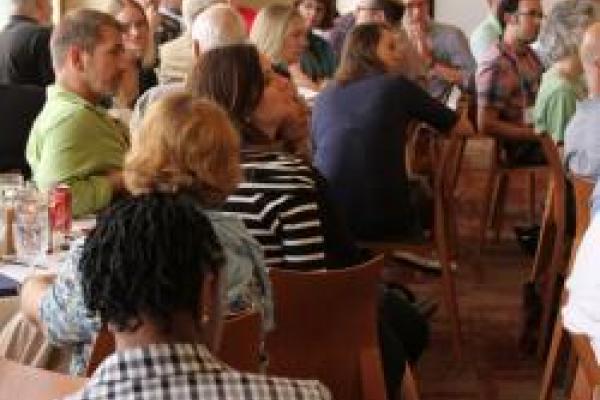Department Retreat Cultivates Strategies for Community Impact

Originally published September 26, 2014
On August 22, over 110 faculty, staff, graduate and undergraduate students in the Department of English gathered at the Barrister Club in the South Campus Gateway for a retreat focused on the general topic of The Future of English Studies at OSU and Beyond.
Department chair Debra Moddelmog opened the day’s conversations with a presentation that focused on an apparent decreasing sense of the importance, relevance, and usefulness of English (and the Humanities more generally) both at the university and nationally. Although she noted that there is at least a 30-year history of a national discourse about the “crisis in the Humanities,” recent trends have provided a new context for thinking about the relevance of the Humanities as well as raised the stakes for addressing misconceptions about the value of our fields. For example, an economic recession has prompted many students to seek so-called “vocational” majors, such as Engineering and Business. In addition, a national focus on a U.S. “innovation deficit” in science and technology has generated increased interest in Science, Technology, Engineering, Mathematics, and Medicine, also known as the STEMM fields. This interest has been most prominently captured at Ohio State through the new Discovery Themes initiative, which has set aside significant resources to promote projects and faculty hires in the areas of Health and Wellness, Food Production and Security, and Energy and the Environment. The first phase of this initiative also includes developing a new major in Data Analytics, which will involve extensive hiring over the next several years.
Moddelmog emphasized that these are all vital areas for research and problem-solving, and recognized the global importance of each of these areas. At the same time, she wondered whether English and the Humanities more generally might become more significant contributors to the Discovery Themes (e.g., we have experts in Disability Studies, Medical Humanities, and Science and Technical writing) and whether we might take steps to promote our value more generally so that the relevance of English studies (a hugely diverse field with expansive interdisciplinary connections) becomes more visible and understandable to multiple audiences.
The retreat then turned to a focus on three major topics for addressing the questions of visibility, relevance, and value of English at OSU and more generally in our society: Communications, “Professionalization” (i.e., preparing our students for a variety of careers and other post-graduate opportunities), and Connections (i.e., what kinds of helpful, even necessary connections might be formed with prospective students, current students, alumni, other units or initiatives on campus, non-academic communities, other English departments, etc.). Focus groups were encouraged to come up with ideas related to each area as well as to think about ways in which faculty, staff, and students might become our own best advocates for English studies.
The energetic small-group discussions covered a range of material and generated a variety of ideas that were then discussed by the larger body. For example, senior lecturer Cathy Ryan suggested, “We need to identify our allies—people who believe English majors offer great value. In medicine, students with Humanities backgrounds are in high demand.” As another example, a number of faculty, staff, and students collectively emphasized interdisciplinary research across scholarly topics as a way to build professional connections both inside and outside the university. Several undergraduate students spoke passionately about the role that they and their English-major peers—all of whom love the major and our department—might play in recruiting high school students or incoming students to the English major. Sydney Watsek, English major and student front desk assistant, spoke through her student recruitment experience with the English Undergraduate Organization. “In very few majors is there the same level of passion found in English. Future English majors resonate with passion. We try to impress upon them the importance of involving their passion in their studies, but also in community. Through community we can celebrate the successes of recent graduates, our undergraduate leaders and friends, and cultivate a sense of camaraderie born out of the belief that what we're studying is meaningful. English will not only help us in our careers, but help us to become better people.”
Although no decisions were made at the retreat—it was strictly a communal brainstorming session—pages of notes were taken that have been compiled for departmental consideration as we move forward this year. Some of the ideas will become proposals for discussion in our committees or at departmental meetings. Others (such as a revamping of our website to appeal more immediately to students) are already in the process of being enacted. Conversations from the retreat have continued informally given that topics raised there remain on the minds of faculty, staff, and students. In a post-retreat interview, MFA Director and Professor Michelle Herman emphasized the major’s versatility and how faculty can help students by acknowledging professionalization. “Not all English majors are on the road to PhD. We, as instructors, need to be conscious of what anxieties these students are facing: the job market, unemployment, graduate school, or independent pathways. We must and can offer students support by stimulating our traditional definitions of English to incorporate the 21st-century student.”
Similarly, in an email correspondence, associate professor Angus Fletcher remarked, “[Our studies] contain the love of literature for literature’s sake but also enable critical interpretation of today’s popular cultures, social spaces, and literatures.” For Fletcher, who arrived last year with a screenwriting background, scholarship and industry work closely for the contemporary English student. “Literature has a long track record of helping students develop practical skills, from providing the rhetorical training that is important in communication, to stimulating the curiosity about other cultures and peoples that is necessary for politics and business.”
As a final example, Deb Lowry, Associate Director of Curriculum and Assessment recently claimed, “Literary texts tell the story of where we’ve been and can help to determine where we’re going “Our job is to put two and two together, enlighten students and make their futures productive ones.”
